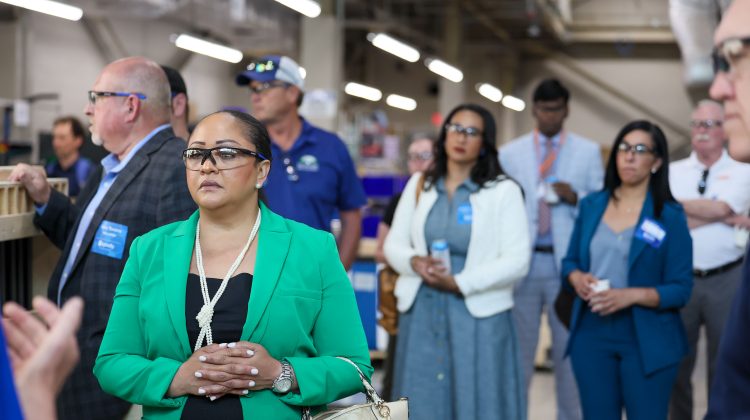METHUEN — Bigbelly Solar, LLC, a world leader in public space waste and recycling solutions for more than 20 years, marked the grand opening of its U.S. manufacturing facility on Monday.
The facility, which sits on the Methuen/Lawrence line, is the primary production location for Bigbelly-branded bins, from budget-friendly to solar-powered smart waste options.
Speakers at Monday’s event included Mayor Neil Perry, Lawrence Mayor Brian DePeña, state Rep. Estela Reyes, state Rep. Francisco Paulino, and Lawrence Deputy DPW Director Rosanna Del Rosario.
Bigbelly provides a variety of waste solutions for more than 2,500 active customers in 60 countries. Bigbelly bins deliver complete waste containment, creating safe, clean, and welcoming public spaces in communities, college campuses, entertainment districts, transit hubs, and businesses.
There are approximately two-dozen employees at the Methuen location, performing jobs that were previously conducted by a third party outside of the U.S. until Bigbelly insourced its U.S. manufacturing operation to the Merrimack Valley in 2023.
“We’re excited to bring local, innovative employment opportunities to the Merrimack Valley,” said Jeff Satwicz, Bigbelly’s founder and VP of business development. “Mass. workers are engaged, productive and deliver a cost-competitive product to better our world.”
Bigbelly Methuen is located on the Lawrence line in the former Malden Mills complex. The building, now owned by IndusPad, sits on 75 acres on the Spicket River Greenway. The way the space is laid out in the former Polartec building, Bigbelly bins are built in Methuen and shipped from Lawrence to sites throughout North America and aboard.
With corporate headquarters in Needham, Bigbelly’s strategic manufacturing locations in Methuen and Stadtlohn, Germany, which serves Europe and Asia, allow Bigbelly to serve communities across the world more efficiently, providing a shorter lead time and enhanced value proposition.
The business was founded in 2003 by Satwicz, a freshman at Olin College of Engineering at the time, and three of his friends from Olin and Babson College. Their first bin was sold in 2004 to a Vail, Colo. ski resort, and they brought the company to market in 2005.
Bigbelly was founded on the promise of increased productivity by compacting waste using the power of the sun instead of electricity. Compaction results in five times the capacity of a traditional barrel, avoids overflows, and reduces costs. Bigbelly’s fully enclosed bins also lead to a reduction in litter, pests, and odor.
Municipalities using Bigbelly bins reduce their collections by 80%, leading to a 70% decrease in carbon footprint due to fewer truck trips. The bins also provide measurable recycling diversion rates.
Bigbelly bins have a visible impact on the environment, helping communities achieve beautification and sustainability goals by implementing uniform waste management, recycling, reducing greenhouse gas emissions through reduced collections, and preventing plastics pollution.
In 2010, Bigbelly developed smart bins, which, through the use of a software platform, provide real-time information on the status of the bins, reporting overflow, or other issues. An automated collection report lists bins that need to be emptied before they reach capacity.
The Bigbelly Element is a budget-friendly bin, delivering complete waste containment at a more affordable price. Bigbelly has a suite of bins for customers to choose from.
“Our mission is to become a world leader in making public spaces better, more beautiful and welcoming through complete waste containment, which eliminates litter, pests and odor from overflow,” Satwicz said.
Bigbelly recently launched Bigbelly Smart Compost, a residential food waste-collection program that provides a convenient, cost-effective way for residents to dispose of food waste in the most environmentally responsible way available.
Built in 1906, Malden Mills was the original manufacturer of Polartec and other textiles. The factory burned down on Dec. 11, 1995 leaving 3,000 employees out of work. CEO Aaron Feuerstein continued paying the salaries of the unemployed workers while the factory was being rebuilt. The new building opened in 1996.
Malden Mills declared bankruptcy in November 2001, and the building was purchased in 2007 by a newly formed company called Polartec. In December 2015, the company announced that it was moving its manufacturing operation to New Hampshire and Tennessee.
IndusPad was founded by Jitender Makkar in 2017, the year he bought the Malden Mills site. IndusPad’s goal is to bring manufacturing and innovation under one roof. Bigbelly is one of 14 anchor tenants at the Methuen location.
“We truly believe in creating manufacturing jobs in the U.S. and developing a launching pad for innovative businesses like Bigbelly,” Makkar said. “We are privileged to be a part of their growth story.”

